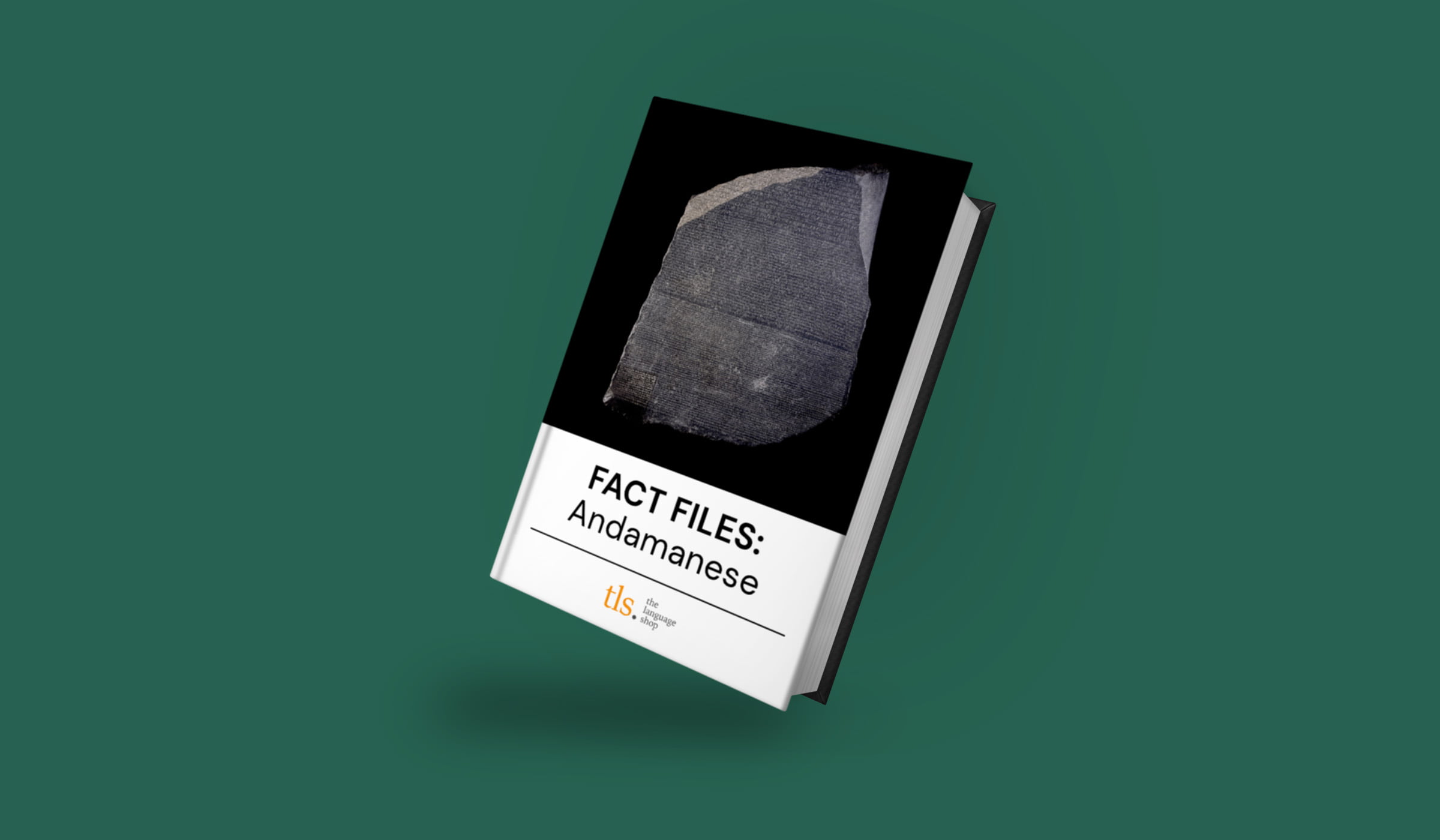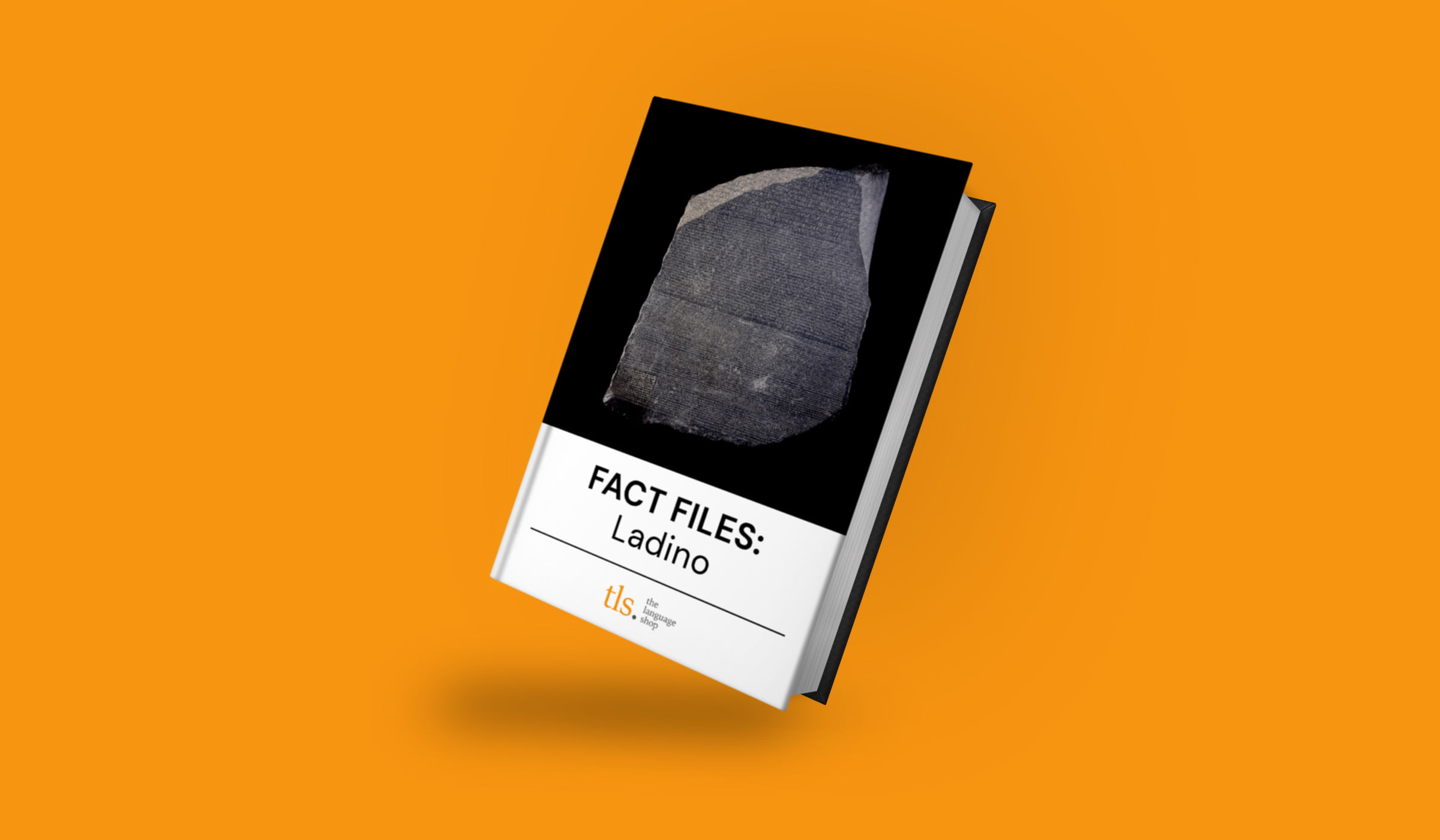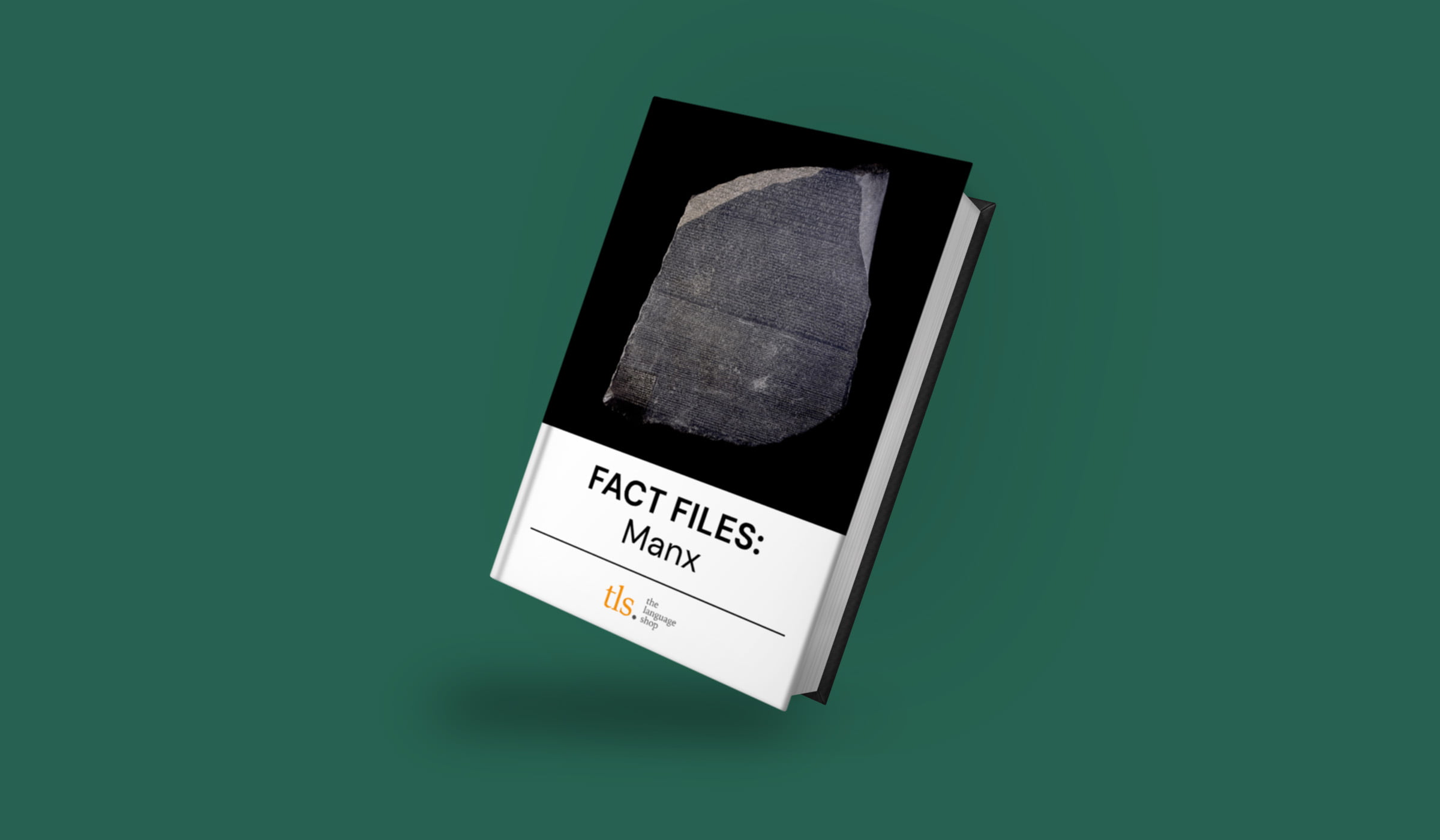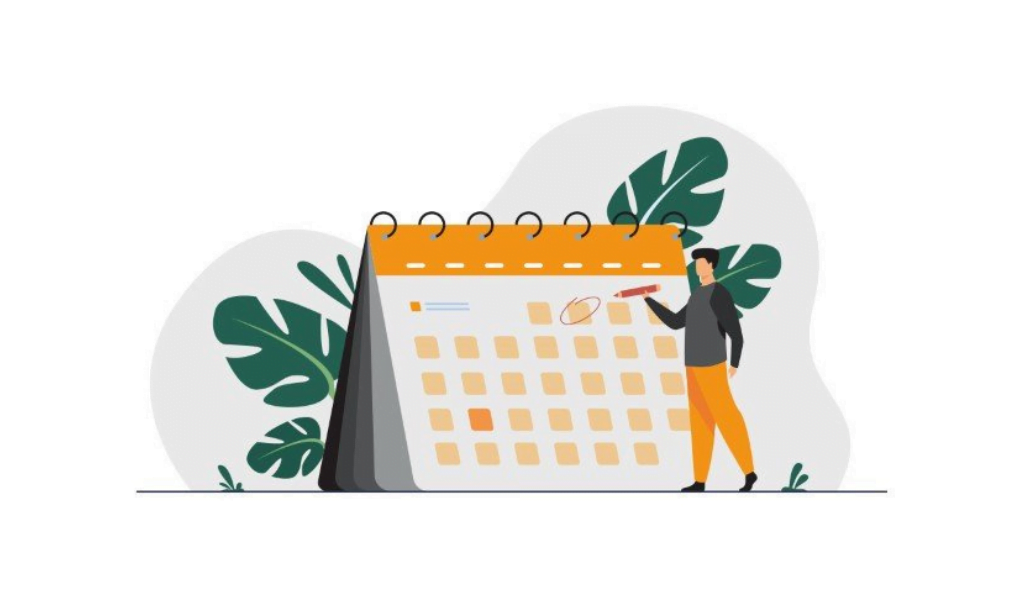Rare language fact file: Andamanese languages

At The Language Shop we like to shine a light on some of the rarer languages spoken across the world, many of which have long and fascinating histories. This month we take a closer look at the Andamanese languages.
Native to: The Andaman Islands
Number of native speakers: Approximately 344
Spoken by: People living on the Andaman Islands
Learn some: Despite being tiny, the islands are home to very distinct languages. Bengali is the most widely spoken language across the islands, so a safe bet for greeting people is nomoshkar, which is the Bengali for hello.
Interesting facts:
- Great Andamanese is unlike any other language on the planet and is believed to be one of the very few remaining palaeolithic languages. This language is distinct from those spoken by other tribes on the islands, the Jarawas and the Onges; for example, eye in Jarawa and Onges languages is ejebo, whereas in Great Andamanese it is ulu.
- The British built a penal colony on the Andaman Islands in the second half of the 19th century. Prior to this, there was no written record of the Andamanese, but indications are that as many as 5,000 islanders lived there. With an influx of foreigners on the islands, by 1961 there were just 19 Andamanese left, due to disease and poor living conditions.
- Possibly in response to this, the Sentinelese islanders, whose homes lie to the west of the main Archipelago, are extremely resistant to any contact with the rest of the world. They are known to have killed people for coming near to their island, including a Christian missionary as recently as 2018. As a result, almost nothing is known about them or their language.
The Language Shop provides support in any language you may need, including many of the rarer ones. Get in touch with us to find out more.
Keep up to date with all our latest news here and on social media – we are on Facebook, Twitter and LinkedIn.
Celebrations around the world: Akshaya Tritiya, 3rd May

The Language Shop explores the festivals and events celebrated by different cultures around the world. This month we look at Akshaya Tritiya, which takes place on 3rd May.
What: Akshaya Tritiya is an annual celebration of spring in India and Nepal for Hindus and Jains.
Why: The day falls on the birthday of Parasurama, the sixth incarnation of Vishnu. It also commemorates Krishna visiting Draupadi, wife of a prince, in a time of famine, with a magical bowl that would remain full until all the prince’s otherwordly guests had been fed.
How: This annual celebration is considered an auspicious day to start new ventures, get married and buy gold. People celebrate the day by praying to their relatives who have passed. Some fast or give away possessions in the pursuit of blessings from the Almighty.
Keep up to date with all our latest news here and on social media – we are on Facebook, Twitter and LinkedIn.
Meet The Team: Omead Hussain, Freelance Interpreter

Every month, we introduce you to one of our team. This month, meet Omead Hussain, one of our freelance interpreters working in English, Arabic and Kurdish.
Tell us about the role you do for TLS
My role is to bridge the communication gap between two or more parties who do not speak the same language. We must be impartial and I cannot favour the client or the other side.
What's been your favourite project at TLS?
The video project I did with Newham Council to improve communication with children and young adults in the social care system. The project produced videos that explain the various social care procedures for children in care, unaccompanied asylum seekers and the parents of children being reviewed by children’s social care services. The videos are in the languages most common in Newham (other than English); Kurdish and Arabic are two of these languages.
What has been your biggest challenge?
Inability to hear the speaker, cultural knowledge and interpreting jokes, humour and sarcasm.
If you didn’t do your current job, what would you like to do?
I wanted to be a civilian pilot or a famous actor.
Tell us something interesting about you.
When I was in Kurdistan/Iraq, I was a head of department and lecturer at a university. I loved my job so much as I like administration and leadership, but unfortunately I did not find an opportunity here in Britain to be a university professor. I love to travel - for both business and leisure. I really enjoy reading and like change, whether in my field of work or my life. I am really interested in football and my favourite team is Liverpool. I like quiet music.
If you could meet someone living or dead who would it be and why?
My Mum and Dad both passed away a long time ago, not a day goes by when I don’t think about something I would like to ask them or tell them. My country did not have good health services so I would've liked to take them to the best specialist doctor, but at the time I couldn't afford to take them abroad to treat them.
What are your ambitions for the rest of the year?
Travel the world, win the lottery, be financially secure, buy a house and apply for a PhD.
Say hello to Omead on The Language Shop’s social media – we are on Facebook, Twitter and LinkedIn. Keep up to date with all our latest news here.
Rare language fact file: Ladino

At The Language Shop we like to shine a light on some of the rarer languages spoken across the world, many of which have long and fascinating histories. This month we take a closer look at Ladino.
Native to: Europe, but predominantly spoken in Israel
Number of native speakers: Less than 60,000
Spoken by: Some groups of Sephardic Jews
Learn some Ladino: If someone sneezes, the Ladino way to respond is a bit longer than the English. They say: “Bivas, kreskas, engrandeskas, komo un peshiko en aguas freskas! Amen!”
Interesting facts:
- In 1492, Jews living in Spain were forced to either convert to Catholicism or leave. Many fled elsewhere, blending their own language of Old Spanish with Hebrew and the languages of the countries where they settled. The language that evolved was called Judeo-Spanish Ladino. Because the Spanish Jews fled to many different countries, Ladino has a large variety of dialects.
- Ladino has struggled to survive, in part because the community was fractured and its people eventually adopted the various languages of the countries they settled in. In addition to this, the first waves of Jewish diaspora in the US were from mostly Germany and Eastern Europe, and Yiddish became the language of the Jewish community there. There is now a movement to revive the language, driven by Sephardic Jews in the US.
- Ladino was immortalised by Hollywood in the 1986 film, Every Time We Say Goodbye, starring Tom Hanks. In the film, Tom Hanks’ character, a gentile, falls in love with a Sephardic Jewish girl, whose family speaks Ladino.
The Language Shop provides support in any language you may need, including many of the rarer ones. Get in touch with us to find out more.
Keep up to date with all our latest news here and on social media – we are on Facebook, Twitter and LinkedIn.
April dates for your diary
Calendar snapshots
14th – Vaisakhi, Sikh and Hindu
This date marks the solar new year for both Hindus and Sikhs. It is also important to Sikhs as it commemorates the founding of the religion in 1699 under the tenth Sikh Guru, Guru Gobind Singh.
15th – Good Friday, Christian
Good Friday marks the start of the Easter weekend. It marks the crucifixion and death of Jesus Christ, the Christian messiah. It is observed with special church services.
18th – Easter Sunday, Christian
Following the crucifixion, Christians believe that Jesus rose again on Easter Sunday, ascending to heaven. This makes Easter one of the most important festivals of the year for Christians and it is marked with special church services, giving gifts and eating special food, especially chocolate.
April dates
| 3rd | Ramadan begins (Islam) |
| 14th | Vaisakhi (Sikh, Hindu) |
| 15th | Good Friday |
| 15th - 23rd | Passover - begins sunset of Friday, ends nightfall of Saturday; no work permitted 15-16 and 22-23. Work permitted on 17-21 with certain restrictions. (Judaism) |
| 17th | Easter Sunday (Christian) |
| 18th | Easter Monday (Christian) |
| 20th - 24th | National Stalking Awareness Week |
| 21st | First day of Ridván (Bahá’í) |
| 23rd | St George's Day |
| 25th - 1st | Lesbian Visibility Week |
| 29th | Ninth Day of Ridván (Bahá’í) |
| 29th | Laylat al-Qadr (Islam) |
Are you celebrating any festivals this month? Please get in touch and tell us all about it! Email nicole.kershaw@newham.gov.uk.
Keep up to date with all our latest news here and on social media – we are on Facebook, Twitter and LinkedIn.
Celebrations around the world: Ramadan, 2nd April - 1st May

The Language Shop explores the festivals and events celebrated by different cultures around the world. This month we look at Ramadan, which takes place from 2nd April to 1st May, depending on lunar sighting.
What: The Islamic holy month of fasting, abstention, prayer and charity.
Why: It was during this month that the Islamic holy book, the Qur’an, was revealed to the Prophet Muhammed. Muslims fast and abstain from impure thoughts and behaviour during this sacred time to bring themselves closer to God. Going without food and drink during the day also reminds Muslims of the suffering of others in the world. Fasting during Ramadan is known as Sawm, and is one of the five pillars of Islam.
How: In addition to fasting and abstention between sunset and sunrise, Muslims attend special services at their mosque, and many attempt to read the entire Qur’an over the course of the month. Zakat, or giving to charity, is another pillar of Islam, so it is always important to Muslims. However, during Ramadan, it takes on even more importance. Eid al-Fitr marks the end of the month with a two to three day celebration, involving lots of eating, drinking and dressing in your best clothes.
If you are observing Ramadan, we would love to hear about it. Please email nicole.kershaw@newham.gov.uk
Keep up to date with all our latest news here and on social media – we are on Facebook, Twitter and LinkedIn.
European language industry shows steady growth, says survey

The results of the 2022 European Language Industry Survey are in. Launched in 2013 by the European Union of Associations of Translation Companies (EUATC), this year's survey aimed to get a picture of the industry’s response to the last 18 months of pandemic-related disruption.
The news was broadly good; business has remained buoyant following the initial lockdown. There has been less innovation than before the pandemic, possibly reflected by the anxiety many organisations feel about the future. However, market growth for the last financial year is expected to be similar to that pre-covid, demonstrating the resilience of the European language industry and the ever-present demand for international communication.
Read about the results in more detail here.
Keep up to date with all our latest news here and on social media – we are on Facebook, Twitter and LinkedIn.
Meet The Team: Stephanie Bright, Resource and Compliance Manager

Every month, we introduce you to one of our team. This month, meet Stephanie Bright, The Language Shop's Resource and Compliance Manager.
Tell us about what you do for TLS
I am responsible for all recruitment, engagement and associated compliance that has to be considered when recruiting into The Language Shop. Additionally, I am here to support internal teams, employees and our freelance interpreters who do amazing work, day in and day out.
What’s been your favourite project at TLS?
Because my role is so varied it's difficult to pinpoint one specific project. My projects can be recruiting freelance interpreters, enhancing internal teams, conducting feedback reviews or helping out in a team if they are short staffed. This is what I love: each day is different but completely people-focused, which is embedded within TLS.
What’s been the biggest challenge?
External influences can impact my role and responsibilities quite quickly so it is important to stay ahead as much as possible and to be aware of such factors all the time.
If you didn’t do your current job, what would you like to do?
I always wanted to be a nurse. It would have to be a role where I could make a difference like I do in my current role with TLS.
Tell us something interesting about you
I am a mum to a 10 year old boy and in my spare time enjoy the outdoors.
If you could meet anyone, living or dead, who would it be and why?
My grandma, unfortunately she never met my son, so would love that and to also enjoy her Yorkshire puddings again. She made them like pancakes and they were the best!
What are your ambitions for 2022?
To continue being a valued asset and team member to TLS. As the business grows, I am constantly learning new skills and experiences.
Say hello to Stephanie on The Language Shop’s social media – we are on Facebook, Twitter and LinkedIn. Keep up to date with all our latest news here.
Rare language fact file: Manx

Here at The Language Shop we like to shine a light on some of the rarer languages spoken across the world, many of which have long and fascinating histories. This month we take a closer look at Manx.
Native to: Isle of Man, UK
Number of native speakers: 53 (first language)
Spoken by: The Manx people
Learn some Manx: Greet people by saying ‘moghrey mie’. If they say ‘Kys t’ou?’ they are asking how you are. You can reply to with, ‘Mie dy liooar’, which means ‘well enough’.
Interesting facts:
- Manx was officially declared extinct in 2009. However, thanks to efforts to revive it, it has now been promoted to critically endangered.
- Although the Isle of Man is only 33 miles long and 13 miles wide, Manx actually has two dialects, one from the north and one from the south of the island. The variation spoken in the centrally located capital, Douglas, is considered to be the standard.
- The language became less and less popular in the early 20th century because people associated it with poverty. Many Manx people opted for English instead, and there was a popular Manx saying: “Cha jean oo cosney ping lesh y Ghailck”, meaning: “You will not earn a penny with Manx.”
The Language Shop provides support in any language you may need, including many of the rarer ones. Get in touch with us to find out more.
Keep up to date with all our latest news here and on social media – we are on Facebook, Twitter and LinkedIn.
Celebrations around the world: Purim, 16-17 March

TLS delves deeper into the festivals and events celebrated by different cultures around the world. This month we look at Purim on 16th and 17th March.
What: Purim is a Jewish festival that falls on the 14th of the Hebrew month of Adar. In 2022, it will last from the evening of 16th March through to the evening of 17th.
Why: In the 4th century BC, the Persian Empire ruled over all the Jews. Its king married a woman named Esther, who was Jewish but kept this fact hidden from the king. A Jew-hating man named Haman had been appointed prime minister.
When Esther’s cousin, Mordechai, refused to bow to the prime minister, Haman drew lots (this is what gives Purim its name) to decide the on which date he would annihilate all Jews: the 13th of Adar. While Mordechai gathered support from other Jews, Esther held a banquet where she revealed her Jewish identity to her husband.
Haman was subsequently hanged, and on the 13th Adar, Jews fought their enemies and were victorious. On the 14th, they celebrated.
How: Purim is known as the wildest and most fun of all Jewish celebrations. Children (and some adults) put on fancy dress, people give money to the poor and gifts (traditionally two kinds of food) to each other and loved ones meet to share a Purim feast.
If you are celebrating Purim, we would love to hear about it. Please email nicole.kershaw@newham.gov.uk
Keep up to date with all our latest news here and on social media – we are on Facebook, Twitter and LinkedIn.












